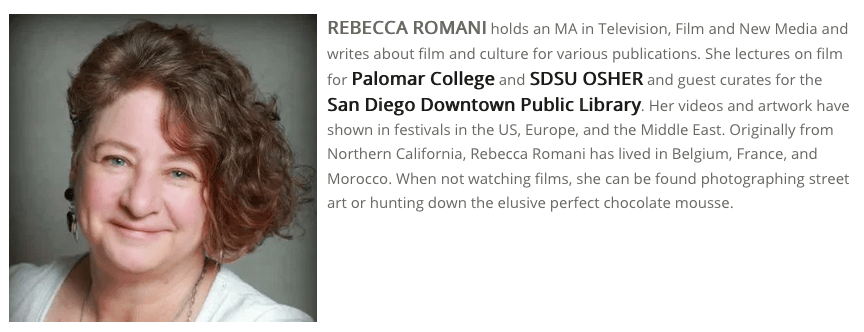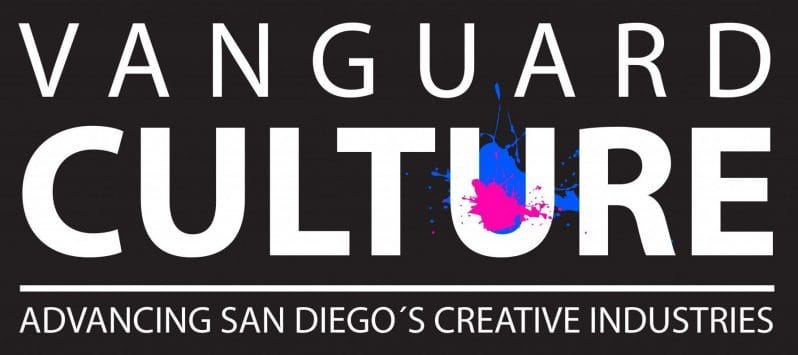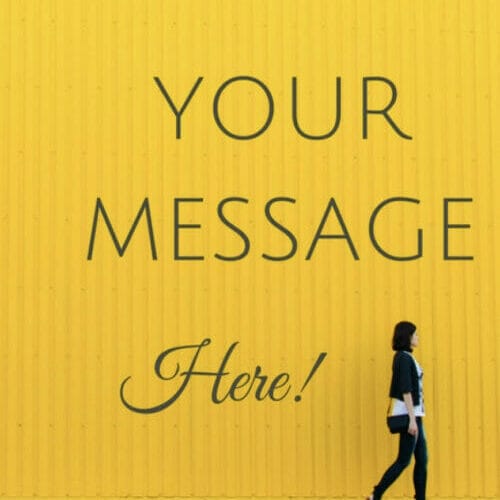
This past weekend marked the beginning of the 13th San Diego Arab Film Festival (AFF), currently at the Museum of Photographic Arts in Balboa for one more weekend.
The festival features a wide variety of shorts and features from Morocco to Yemen, as well as from Arab-American communities in the US. The festival started with 3 films in 2012 and has steadily grown to over 12 films across two weekends.
The festival shows a combination of shorts and features, many of which are recent releases and have done well in festivals worldwide. Most films are in Arabic or regional languages like French or Berber with English subtitles. Because many of the films have just been released, only their trailers are online at the moment. Hopefully some of the features will be picked up soon for streaming.
This year’s festival is also dedicated to Stephanie Jennings, a major member of the festival and of Karama Now, the festival’s parent association. Jennings, who passed away in 2022, was deeply devoted to peace and understanding of the Middle East, with a particular interest in Palestine from living there as a child and numerous visits.
Karama Now is a local non-profit whose mission is to foster a greater understanding of the Arab world, its cultures, and issues.
One of the purposes of the festival, said Bassemah Darwish of the Karama Board, in her opening remarks for the festival, is to show and educate the public on Arab film and various aspects of Arab culture.
Another goal, which the festival shares with other ethnic-based festivals in town such as the Latino and Asian/Pacific Islander film festivals, is more authentic representation of the various Arab societies as well as communities within the US.
The AFF has historically been popular with both Middle Eastern and non- audiences alike and this year is no exception. The opening night films played to a full house, and it is very likely that next weekend’s programming might be equally popular.
Coming up this weekend:
Friday:
The screening starts at 7:20 pm.
The short, The Time We Meet (2022), comes from Lebanon. An allegory about belonging and hospitality played out through an invitation and a backgammon game between a Palestinian man and a stranger.

The feature, Fez Summer, ‘55 (Morocco, 2023) is probably one of the most beautiful films to come out of Morocco in several years. Beautifully shot and surprisingly intimate, the film is a coming-of-age allegory. A young boy, Kamal on the cusp of adulthood, learns about resistance and the hopes for a new Morocco on the eve of independence from France, in the more traditional medina of Fez. Kamal meets members of the resistance movement through his college-age neighbor, Aicha.
While the film owes a lot to The Battle of Algiers (Pontecorvo, 1966), it is also a very loving look at a country about to come into its own. The role of women is changing, the King is returning from the exile imposed by the French, the world seems full of possibilities to a young Kamal both fascinated and intimidated by girls and the resistance.
Saturday
Screening starts at 6 pm.
M’dina (Tunisia 2023), a short, is an experimental documentary short that explores the medina (old city) of Tunis through the eyes of a Syrian filmmaker living in Germany. Not a lot is filmed about the original sections (pre-French occupation) of Tunisian cities so this should be interesting.
Dancing on the Edge of a Volcano (Lebanon, 2023), not quite a documentary feature, is set in Lebanon in the aftermath of the catastrophic explosion in the port of Beirut in 2020. Director Cyrus Aris tells the story of the explosion through the real story of a film crew struggling to shoot a film, Costa Brava, Lebanon with Nadine Labaki. The explosion nearly killed the production, but the crew soldiered on while Beirut wrestled with feelings of disbelief and betrayal by the Lebanese government and the port authority. Costa Brava itself was eventually finished and released in 2021.
Screening starts at 8:15 p.m.
Phone Breaker (Morocco, 2023). Jalil has quite a temper…and a strong dislike of cell phones. One day he discovers his calling- ridding the world – or at least the people around him, of cellphones…A short comedy about the inconveniences of modern life, heroically saving society, and then finding out it doesn’t want to be saved after all…
The Burdened (Yemen, 2023), is based on the true story of a couple in Aden, Yemen, who find themselves out of work, in economic difficulty due to the war, and expecting a child. How they cope with all this touches on traditional and modern solutions.
This is the second film by Yemeni director Amr Gamel to screen at the festival. It is rare that a full-length feature film comes out of Yemen and rarer still to see a such a frank depiction of Yemeni life.
Sunday
The final day of the festival. The first screening starts at 5:30 pm.
Father’s Footsteps (Syria, 2023) is a gorgeous movie about another overwhelming war situation, the Syrian conflict. Again, filmmaking in Syria is difficult and it is rare that something so beautiful comes out of Syria. But come it has. The film revolves around a woman who has lost her husband and must protect her mute child by assuming the roles of both father and mother despite their precarious position. Visually, the film is stunning with desaturated colors to amplify the situation.
Probably not appropriate for kids under 15.
Dounia and the Princess of Aleppo (Morocco, 2021), is a charming well-done animated film that works well for younger viewers. Done in a simple unadorned style, the film turns on the story of Dounia, whose name means “The World,” who lives in Aleppo, an ancient city in Syria. But one day, war breaks out and Dounia must learn what it means to flee. She carries with her the memory of her grandmother’s amazing stories and a handful of nigella seeds, sometimes known as black cumin, used in regional cooking, and said to be able to cure anything. With her grandmother’s wisdom and magical Levantine stories, Dounia makes her way to a new reality.
The film is a good look at what happens when a child needs to face displacement without being maudlin or overdramatic. It also addresses how one might remember one’s roots, a common issue facing displaced children of many populations.
The second round of screenings starts at 7:35 pm. The short, Mar Mama (Palestine, 2023), tells the story of a young girl who has lost her mother, and worried by IDF attacks on her city, starts to obsess about death. Out of concern, her father tries to make little films to distract her, and the girl escapes through her imagination.
Lyd, (Palestine/UK/US, 2023) is an interesting choice to end the festival. It’s a hybrid sci-fi documentary that revisits the history of the historic Palestinian town of Lyd, now known as Lod, in which the town that tells its 5,000-year-old story from its Neolithic Era beginnings, a brief stint as the capital of the military district of Palestine under the Umayyad caliphate, to its contested condition after 1948.
Eventually, the town looks to its future, knowing that every event can have various outcomes, and tries to imagine what it will be next and who will live there
The film is a hybrid of animation, interviews, archival footage from the Palmach and other entities.
How to festival:
Some films will probably be very popular. It is recommended to buy tickets online as early as possible here. You can still buy day passes or you can buy tickets at the door. Parking is relatively easy. You can park in the parking lot behind the Fleet Science Center or continue over the bridge to the small parking lot that is to the left of MOPA.
Also, to note- the festival traditionally has Middle Eastern food for sale as well coffee and tea that you can dip into between films.
Last week’s micro-reviews:
I am From Palestine (short, USA, 2003)
A charming, well-illustrated animated short about a young Palestinian-American girl, Saamidah, starting school in the US. When asked to mark where her family is from on the class world map, Saamidah can’t find Palestine because it is not there. The next day, Saamidah brings something to help her explain where her family is from.
A House in Jerusalem (Palestine, 2023)
Beautifully shot- the film explores deep grief and trauma, the kind that gets under your skin and leaves the ghost of you at that moment stuck in the place where it happened. The film also uses that trauma as a metaphor for the events that happened in 1948 and after.
A young British Jewish girl, Rebecca, loses her mother in a tragic car accident, and her father, thinking a change would do them both good, takes them back to his father’s house in Jerusalem. Rebecca continues to have nightmares of standing at the scene of the accident, and calling for help, yet no one can see here. However, once at the house, Rebecca encounters another little girl, Rasha, who roams the house, moving things, searching for something. However, only Rebecca can see her. Eventually, Rebecca learns Rasha’s story, that she was hiding in the house’s well when her family was forced to leave, and that she lost the doll her mother made her. Rebecca goes on a journey to Bethlehem to find the person who made the doll and acquire a new one for Rasha. What Rebecca finds is both heart-breaking and instructive.
The story owes a lot to a British children’s series, The Green Knowe series, written in the 60’s. The stories feature a very old manor house in which the spirits of past residents interact with a child who lives there in the present. Like Rebecca, only he can see them. And like, Rebecca, the spirits help him move past the trauma he carries.
A Calling, from the Desert to the Sea (Jordan, 2022)
Ahlam, married young, convinces her younger sister, Yasmin, to escape with her out to a beautiful section of the Jordanian desert. Her reasoning, she wants her little sister to see the sea, but what she really wants is to thwart her father’s plan to marry off her sister soon. A beautiful short with gorgeous vistas from the Jordanian desert, the film includes some surprising elements such as reworked vistas, a monster inspired by Jurassic Park, and a compelling story that subtly questions traditional patriarchy’s control over women and girls.
Machtat, (Tunisia, 2023)
The documentary follows a family of female wedding singers in Tunisia. Wedding singers are a long-standing tradition in North Africa and often sing for almost all the events of traditional weddings, including the henna ceremonies and the signing of the marriage contract. The documentary feels more like a student film as it documents the bickering and interactions between the women, their children, and their husbands and feels like a TV tabloid show.
The film could also do with a more observant editor. The continuity is off, and one starts to wonder if the reality-TV like atmosphere is real or manufactured. This is fostered in part because the henna on the women’s hands and feet varies from shot to shot. Sometimes it is there, sometimes it looks freshly applied, and in the next shot, it seems to have been scraped off, leaving only the stain of the design. Maybe that is a metaphor for the film.
That Seven Days (Palestine, 2023) is a poetic remembrance of not only Gaza, but a spouse passed too soon. It’s poetic but lacks a clear story. The new husband is a Gazan fisherman, the new bride is remembering the seven days of the wedding. Something has happened, but it is never clarified- was he killed by the occupation, an illness, an accident? How long ago?
While a visually beautiful film, its impact is undermined by the uncertain narrative.

Aida Returns (Palestine/Lebanon, 2023) is the second documentary by documentary filmmaker Carol Mansour to screen at the AFF. It’s a moving documentary, filled with a daughter’s love for a mother slowly being eroded by Alzheimer’s.
In their conversations, we learn Mansour’s mother left Yafa as part of the expulsions of Palestinians in 1948. As her awareness of the present fades, she rediscovers the Yafa of her youth. Once her mother passes, Mansour struggles to make her mother’s wished for return to Yafa a reality by enlisting friends to surreptitiously scatter her ashes in the garden of the former family home and in the places she loved in Yafa. Mansour, herself, is not allowed to return to Yafa because Israel does not allow Palestinian refugees or their descendants to return, but through the documentation of the process, Mansour, too, is able to return to her family’s memories and neighborhood.
The film festival continues at the MOPA through April 21. See the Arab Film Festival for more information on times and tickets.







